Our Employer Partnership Brochure highlights how partnering with BIT helps organizations build stronger, more equitable teams while meeting real business needs. It outlines the impact of our talent programs, apprenticeship pathways, and workforce solutions – showing employers how they can access skilled professionals, drive innovation, and create lasting change.
Blog
NorthBay Case Study
We’re proud to share a new case study featuring our partnership with NorthBay and the transformation of their fundraising operations. By optimizing their existing Salesforce Nonprofit Success Pack (NPSP) and integrating Mailchimp, BIT helped replace manual, spreadsheet-based processes with a streamlined, centralized system.
The result: stronger donor and grant tracking, improved reporting, and a scalable, cost-efficient foundation for growth.
Read the full case study to see how BIT helps organizations maximize the power of Salesforce.
DenAI Summit Recap: A New Model for Government
DenAI Summit Recap: A New Model for Government

Recently, the Colorado Technology Association, the City and County of Denver, Visit Denver, Caruso Ventures, Range Ventures, and Slalom hosted the second annual DenAI Summit. This sold-out event, held at the Denver Art Museum, brought together government leaders, digital practitioners, academics, and vendors for two days of talks about how AI changes the way our government can serve citizens.
We’re delighted that DenAI invited us to be part of the conversation.
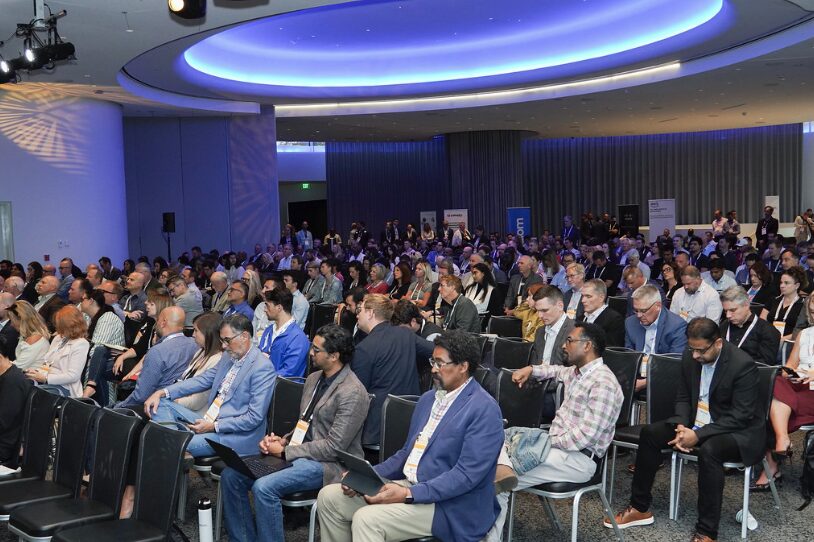
Job Accessible AI Levels the Playing Field
Blind Institute of Technology (BIT) is an early AI adopter – and we’re an accelerator.
- As consulting partners, BIT works with large-scale organizations seeking to implement Salesforce or build AI agents using Agentforce.
- And, as a team of IAAP-certified native assistive technology users, BIT works extensively with government agencies on accessibility maturity, PDF & website remediation, and legal & policy guidance.
For traditional software, accessibility is largely determined at the user interface (UI) level. However, AI is an entirely new way to engage the digital world. For AI-powered software, access is not just about designing an intentional UI and delivering professional code. For AI, access is shaped by training data.
People with disabilities are routinely underrepresented in training datasets. As a result, systems can bake in bias. For accessible AI to become a reality, people with disabilities need a seat at the table.
Current State
At DenAI, we had many informal “hallway sessions” — 1-on-1s with practitioners and government leadership to learn what animates them most about AI.
Practitioners are experimenting with AI individually, but on the whole have yet to see AI adoption scale agency-wide. We also met with government leaders and heard that updating policy, connecting fragmented systems, and securing the necessary budgets need to happen for AI initiatives to scale.
One panelist, Elaine Kamarck, responsible for modernizing government services during the Clinton Administration, advocated moving quickly. She said that government teams need to “overcome a culture of caution” and reminded the audience that back in the 90s, government was slow to embrace the internet, leading to a host of issues that continue to this day. She cited several costly examples caused by the delay, including several that BIT sees in our digital accessibility remediation work. For example, nearly all government agency websites heavily rely on PDFs to communicate online.
Standout Speakers
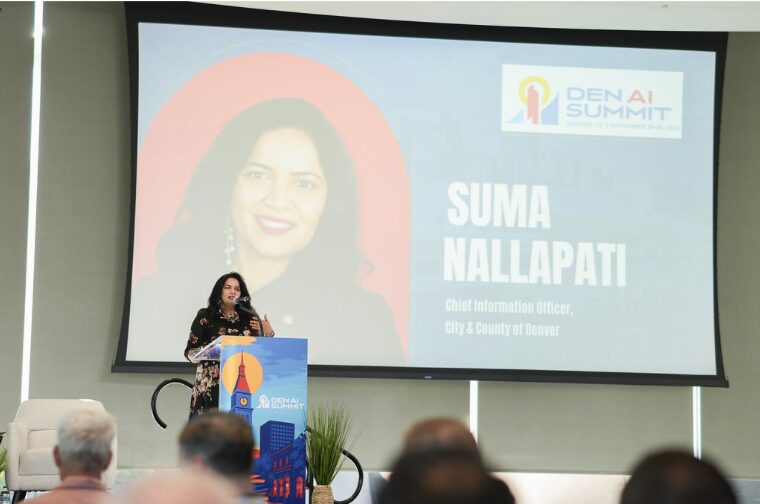
Some highlights from thoughtful presentations and expert panelists:
- Governor of Colorado, Jared Polis & Mayor of Denver, Mike Johnston: Government leadership showed their commitment to growing Colorado as a technology hub. Their message to AI and tech industry leaders, “Colorado is open for business.”
- Tenzin Priyadarshi, President & CEO of the Dalai Lama Center for Ethics and Transformative Values at MIT: AI should be designed to foster empathy, promote civic trust, and reflect human values. Critical decisions must remain under human oversight.
- Daniel Ho, Director of Stanford’s Regulation, Evaluation, and Governance Lab (RegLab): Shared a big win: In order to meet requirements under California’s anti-discrimination laws, Santa Clara County quickly setup an AI-powered app to find outdated, problematic language across millions of real estate records — a task that was previously estimated to take years. Conversely, through a personal anecdote, Ho also illustrated the need for human oversight of AI: he was glad he reviewed an AI-generated bedtime story before reading it to his toddler. Though appropriately prompted, the AI tool wrote a horror story filled with “nightmare fuel.”
Suma Nallapati, City of Denver Chief IA and Information Officer: Denver’s leading technologist was DenAI’s emcee. She kept the attendees informed, presenters on time, and made it look easy. During DenAI, Major Johnston announced her new title and role with the City, another proof point of Denver’s investment into scaling AI across City services. Congratulations, Suma!
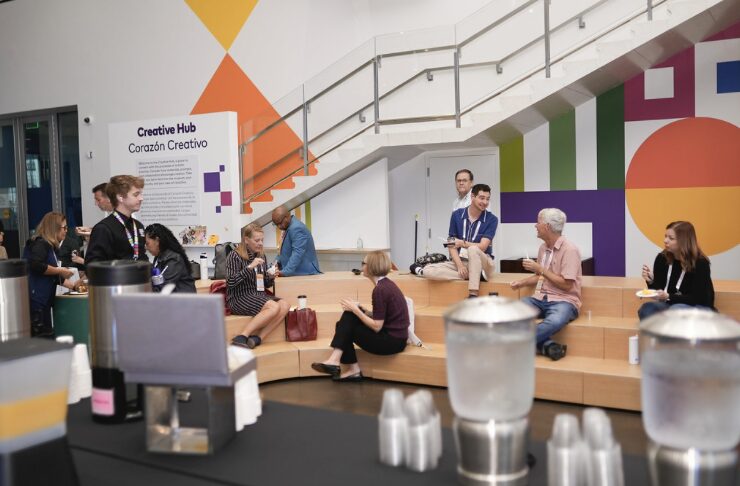
Recurring Themes
There were several recurring themes from panelists, vendor demos, and our informal ”hallway sessions”:
Many organizations mistakenly build new initiatives around specific AI tools. Orgs have far better outcomes when they design solutions to the problems they are trying to solve — and then selecting the right tool for the job. Another common misstep is using AI to augment existing workflows, and overlooking the opportunity to reimagine or eliminate processes entirely.
- Building trust is a priority for government. Civic engagement is at an all-time low. Accountability needs reliable, transparent systems, and human oversight.
- Government agencies need to radically transform how they provide services. Good governance and oversight are foundational. Across industries, approximately 95% internally-led AI initiatives have failed to produce an ROI. Organizations report better outcomes working with outside vendors.
- Good data is critical for accurate results. Fragmented software and legacy systems are a blocker to providing structured, organization-specific training data that improves AI accuracy and nuance.
- Many organizations mistakenly build new initiatives around specific AI tools. Orgs have far better outcomes when they design solutions to the problems they are trying to solve — and then selecting the right tool for the job. Another common misstep is using AI to augment existing workflows, and overlooking the opportunity to reimagine or eliminate processes entirely.
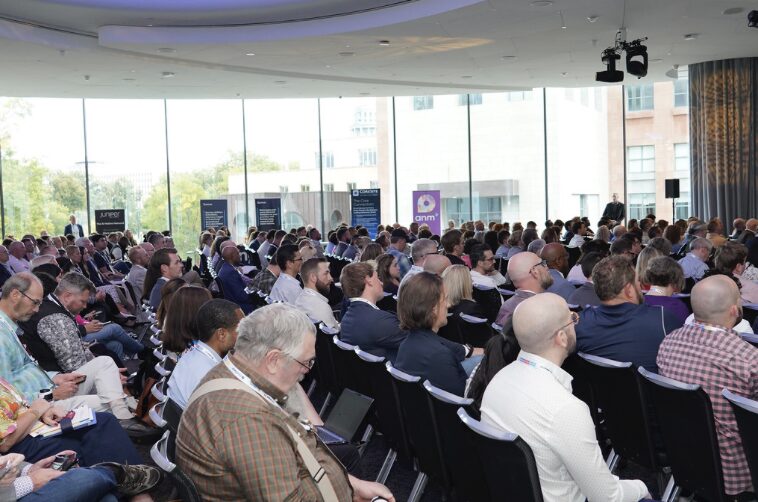
Takeaways
- There’s a ton of excitement around AI. DenAI, only in its second year, was sold out, and had a very long waitlist.
- There are several blockers preventing government from scaling AI initiatives: fragmented systems/poor data, budget constraints, and the need for new policies to address governance, ethics, and security.
- Denver and Colorado are removing those blockers and investing in AI. They see AI as an opportunity to radically grow Colorado’s already-thriving tech community.
Thanks again to the Colorado Technology Association and the City of Denver for putting on a fantastic event! BIT is thrilled to be part of this community. See you next year!
Tell us about your work with digital accessibility, AI, and Agentforce.
About the Writer
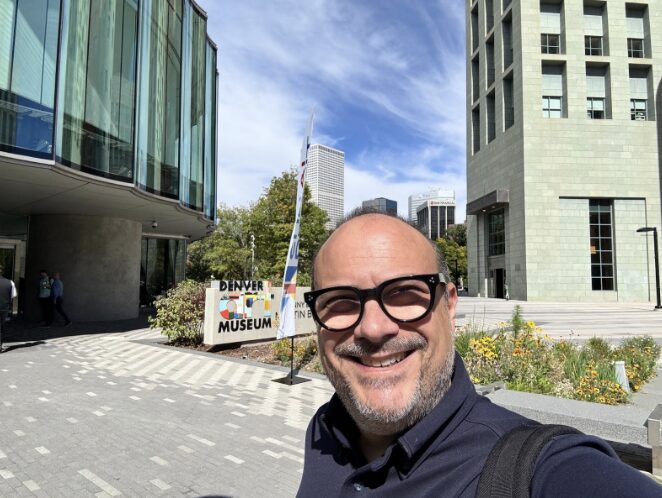
Joe Crespo is a web developer, user experience expert, and technical project manager. Joe has led large-scale digital transformation, content modernization, and document remediation initiatives for government, education, and the Fortune 1000.
Today, Joe is Business Development Director at Blind Institute of Technology (BIT). where he works with government agencies, partners, and technology firms advancing AI, accessibility, and workforce inclusion.
BITs of Glamour: A Masquerade Ball

BITs of Glamour: A Masquerade Ball
Images Description: “BITS of Glamour: A Masquerade Ball” presented by the Blind Institute of Technology, featuring a gold and red eye mask with feathers. The event is on Saturday, February 1, 2025. Early bird ticket prices are $100 each or $1,000 per table. Purchase by January 17, 2025, to get the discount.
BITs of Glamour: A Masquerade Ball

BITs of Glamour: A Masquerade Ball
Images Description: “BITS of Glamour: A Masquerade Ball” presented by the Blind Institute of Technology, featuring a gold and red eye mask with feathers. The event is on Saturday, February 1, 2025. Early bird ticket prices are $100 each or $1,000 per table. Purchase by January 17, 2025, to get the discount.
Open Position: Academy Director
Job Title: Academy Director
Location
Remote
About Us
Blind Institute of Technology (BIT) is a forward-thinking, mission-driven organization dedicated to empowering professionals with disabilities through accessible, high-quality education and training. Our Academy programs, currently offering Salesforce Admin and Digital Accessibility Analyst certification courses, provide participants with the skills, knowledge, and practical experience needed to succeed in the workforce and advance their career opportunities. As we grow and expand our offerings, we are committed to fostering a supportive, inclusive, and dynamic learning environment that embraces diversity and drives success for all.
Due to two recently awarded grants, , we will be significantly growing our course offerings. This includes offering new subject matter, along with expanding the number of our current courses offered both within the US and abroad. All of our courses are offered virtually, are accessible for all disabilities and our complimentary to all of our Career Seekers.
Job Summary
We are seeking a passionate and proactive Academy Director to lead and shape the future of BIT’s Academy programs. As the driving force behind our Academy’s administration and development, you’ll play a pivotal role in enhancing the student and instructor experience, steering the success and growth of our Academy programs.
Your responsibilities as the Academy Director will include developing policies, managing schedules, guiding instructors, and evaluating program effectiveness to ensure a high-quality learning experience for all participants. You’ll ensure that our programs operate smoothly, effectively, and in full alignment with BIT’s mission. As BIT expands its program offerings, the Academy Director will play a critical role in shaping the direction and success of the Academy. Your strategic vision will be key to ensuring the continuous improvement, effective operation, and future expansion of our programs, contributing to BIT Academy’s overall success.
If you’re eager to contribute to BIT’s mission of providing accessible, impactful education and thrive in a collaborative, fast-paced environment, we encourage you to apply and make a meaningful impact in our growing Academy community.
Join us in making a difference by guiding a talented team of educators and helping us grow our mission of accessible education.
Responsibilities
- Policy Development & Implementation:
- Create and enforce policies and procedures to support the effective operation and continuous improvement of BIT Academy programs.
- Ensure all policies are up to date, in line with industry best practices, and comply with organizational standards.
- Regularly review and improve procedures to enhance program efficiency and quality.
- Program Scheduling & Coordination:
- Develop and manage program schedules, ensuring timely course offerings, instructor availability, and efficient use of resources.
- Instructor Support Leadership & Development:
- Provide guidance, mentorship, and support to the team of Academy instructors.
- Facilitate regular check-ins and meetings to support instructional needs and foster a collaborative teaching environment.
- Identify opportunities for instructor development and provide resources for continuous skill-building and training.
- Program Effectiveness & Continuous Improvement:
- Evaluate program effectiveness through participant feedback, completion rates, and performance data.
- Develop and implement assessment tools to gather insights into program quality and learning outcomes.
- Analyze data to identify areas for improvement and execute necessary program enhancements.
- Administrative Oversight & Compliance:
- Ensure that all administrative processes, including enrollment, attendance tracking, and program documentation, are managed efficiently and adhere to organizational and regulatory standards.
- Resource Allocation & Budget Management:
- Prepare and manage the Academy program budgets to ensure efficient use of funds.
- Allocate resources effectively to support current program operations and future growth.
- Monitor expenditures and adjust as necessary to align with organizational priorities and program needs.
- Stakeholder Communication & Support:
- Serve as the primary contact for Academy-related inquiries from leadership and progress reports.
- Build and maintain strong relationships with instructors, participants, community partners, and other stakeholders.
- Prepare regular reports and updates for Salesforce, detailing program progress, participant outcomes, and areas for growth.
- Promote BIT’s Academy programs to external partners and community contacts.
- Strategic Planning & Program Expansion:
- Collaborate with leadership to plan for the growth and expansion of BIT’s Academy offerings.
- Identify operational adjustments needed to improve program scalability while maintaining quality and integrity.
Qualifications
- Education & Experience:
- Bachelor’s degree in Education, Program Administration, Organizational Development, or a related field preferred.
- Proven experience in program administration, educational leadership, or similar roles.
- Knowledge & Skills:
- Strong project management skills with the ability to develop and implement program policies, schedules, and administrative processes.
- Understanding of disability-related learning needs and inclusive teaching practices, with a commitment to creating accessible educational environments.
- Excellent leadership abilities to mentor and support a diverse team of instructors.
- Strong analytical skills to assess program effectiveness and identify opportunities for improvement and scaling.
- Ability to prioritize, multitask, and problem-solve in a fast-paced and dynamic environment.
- Demonstrates effective communication and interpersonal skills.
- Proficiency in Google Suite and MS Office.
- Knowledge of accessible technology and learning tools is preferred.
We are a team of professionals, most possessing a variety of disabilities. Professionals within the disabilities community are strongly encouraged to apply. This position is a fully remote, FTE position with a starting salary range of $65K-$75K annually with a healthy benefits package. We would like to fill this position quickly, so please don’t delay in sending your resume and cover letter to Candidates@BlindIT.org, referencing this position in the subject line.
BITs of Glamour: A Masquerade Ball

BITs of Glamour: A Masquerade Ball
Images Description: “BITS of Glamour: A Masquerade Ball” presented by the Blind Institute of Technology, featuring a gold and red eye mask with feathers. The event is on Saturday, February 1, 2025. Early bird ticket prices are $100 each or $1,000 per table. Purchase by January 17, 2025, to get the discount.
Remembering Doris Marie Barton: A Life of Love and Advocacy

Remembering Doris Marie Barton: A Life of Love and Advocacy
At the Blind Institute of Technology (BIT), we are constantly inspired by the stories of people who bring purpose and heart to their lives. One such story is that of Doris Marie Barton – a beloved grandmother, educator, and advocate who left a lasting legacy.
A Life Well Lived
Born in 1942 in Marshall, Texas, Doris spent her early years in a close-knit community before finding her calling as an English teacher later in life. Known affectionately as “Grammé,” she was a woman of deep faith and unwavering curiosity, always seeking answers and solutions.
In preparation for Y2K, Doris and her husband Gerald moved to a farm in Athens, Texas, transforming it into a sanctuary for her family and a haven for animals. Taylor, her granddaughter and BIT’s Apprenticeship Program Manager, fondly recalls cooking with her and feeding sugar cubes to horses, picking blackberries, and watching ducks waddle through the property. Doris’s love for animals ran so deep that she even dedicated a “cat room” in her garage to care for stray kittens.
Just over an hour outside of Dallas, Taylor remembers visits to Athens as feeling like a mini-vacation – an escape from the busy city to acres of peaceful countryside. Doris loved pet-sitting, finding joy in caring for animals, and creating a welcoming environment for Taylor and her family.
Grace Through Challenges
In her later years, Doris faced vision loss due to macular degeneration, which gradually worsened over the last five years of her life. Despite this, she remained resilient, finding gratitude in the treatments she received and maintaining her signature optimism.
Doris never let her challenges define her. Instead, she focused on learning about the blind and low-vision community, determined to understand and connect with their experiences. This shared understanding brought her closer to Taylor, who also lives with vision loss.
Taylor’s Journey of Advocacy
Doris played a crucial role in shaping Taylor’s perspective on disability and inclusion. Diagnosed with retinitis pigmentosa at just 15, Taylor faced challenges that Doris helped her navigate with love and encouragement. Doris also connected Taylor with others experiencing vision loss, helping her forge meaningful connections and build confidence.
Cooking was another way Doris and Taylor bonded. As Doris began struggling to read recipes, they found joy in learning new ways to cook together. From birds’ nest (or haystacks) – Chinese noodles covered in peanut butter and butterscotch – to her famous million-dollar fudge, Doris passed down her love of cooking and the special recipes that connected their family.
Taylor’s work with BIT has transformed her into a passionate advocate for accessibility. Whether reaching out to companies about usability improvements or sharing her story, Taylor credits BIT and her grandmother for giving her the courage to speak up and make change happen. When asked for advice to give others, Taylor shared, “Advocating for accessibility isn’t just the responsibility of people with disabilities – companies need to take accountability, too,” Taylor says. “Don’t be afraid to speak up!”
Pride in Purpose
When Taylor joined the Blind Institute of Technology, Doris could not have been prouder. She frequently called Taylor, leaving heartfelt voicemails expressing how proud she was of Taylor’s dedication and the incredible impact BIT was making. Doris’s background as a teacher gave her a deep appreciation for purpose-driven work, and she was thrilled to see her granddaughter thrive in an organization dedicated to making a difference.
Doris’s pride in BIT extended beyond words. In her final wishes, she asked friends and family to donate to BIT in lieu of flowers, ensuring that her legacy would continue to support inclusion and opportunity for others.
Carrying the Legacy Forward
Doris’s life was a testament to compassion, curiosity, and purpose. The donations made in her honor will fuel BIT’s mission of empowering professionals with disabilities, continuing her legacy of making the world a better place.
“Her support gave me the foundation to embrace my disability and use it as a strength,” Taylor says. “She taught me to always find joy and to give back wherever I could.”
We are privileged to honor Doris’s memory and carry her kindness and advocacy into our work every day.
C2HR 2024 Award Recipient
C2HR 2024 Award Recipient

BIT is proud to announce that our Founder/Executive Director, Mike Hess, has been honored with the prestigious C2HR Content & Connectivity Human Resources Game Changer Award in the Ignitor category for his outstanding commitment to creating clear pathways for employment opportunities for professionals with disabilities. Mike’s efforts have truly transformed the landscape for professionals with disabilities.
Check out all the 2024 award winners: https://c2hr.org/2024-winners/
The Show Must Go On… In February
